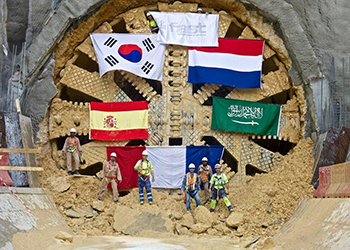Thrust on transportation
01 March 2016
The metro and airport expansion are two key projects in Riyadh which have kept the construction industry buoyant.
Although business sentiment is depressed in the capital, given the plummeting oil prices, the war with Yemen and the air strikes on Syria, mega projects such as the Riyadh Metro and the expansion of Riyadh International Airport have been providing important sources of revenue for the construction sector.
Saudi Arabia’s transport infrastructure has been one of the main targets for government expenditure during the Ninth Development Plan (2010 and 2014), and will continue to benefit under the tenth plan. With plans to diversify the economy, an effective transport network is seen as a key supporting factor to developing an industrial base to reduce Saudi Arabia’s reliance on crude exports.
Additionally, the development of the transport network is expected to meet the demands of a rapidly expanding population and the cyclical effects of a major influx of religious tourists.
BMI Research forecasts that the transport sector will grow in real terms by 7.5 per cent in 2016. Among the key contracts awarded last year in this sector was a $1.46-billion deal for the expansion of King Khalid International Airport. Under the deal, a Hochtief-led consortium is upgrading two terminals at the Riyadh Airport. Construction of the project has already begun, with completion scheduled for May 2019. The project is the first part of a $4.5-billion programme by the General Authority for Civil Aviation (GACA) to develop and expand the airport.
Another major deal in this sector was a SR160.2-million ($42.7 million) contract awarded by Saudi Railways Organization (SRO) to China Railway Construction Corporation (CRCC) for the second phase of a project to upgrade the track on the freight line connecting Riyadh, Harad and Dammam. Under the 23-month contract, a 91-km section will be renewed and the axle load will be increased to 32.5 tonnes.
The steep fall in oil prices has not impacted the implementation of the Riyadh Metro which is reported to be about 26 per cent complete (see separate report). The metro, within King Abdul Aziz Public Transport Project for the capital city, will extend 176 km.
In the real estate sector, the $11.6-billion King Abdullah Financial District (KAFD) has suffered delays and is yet to be officially opened. The initial plan included the construction of 34 buildings over a 1.6-million-sq-m area for the project. There are reported to be about 112 buildings now and more are being added.
Spearheading the development of the Saudi capital is the High Commission for the Development of Riyadh, which recently highlighted the major opportunities for investors across several sectors in its investment climate report for last year.
In the real estate sector, construction of houses has kept pace with the eight per cent growth in the population, with one million units built, and vacancies of only 4.3 per cent. This was a strong indicator of the relative balance between supply and demand, the report stated.
According to real estate expert JLL, Riyadh’s prime residential property market is maintaining steady performance. Approximately 17,000 units entered the market last year, the majority of which were standalone villas or small apartment buildings, stated JLL in its annual review of the Saudi Arabia Real Estate Market for 2015.
Looking ahead at the upcoming supply, JLL said there are a number of large-scale projects in the capital including Green Oasis and the second phase of Manazil Qurdoba, which will deliver 930 and 700 residential units respectively.
- Thrust on transportation
- Majid Al Futtaim to build two malls in Riyadh
- Riyadh Metro marks new TBM milestone
- RMD Kwikform eases work on metro



